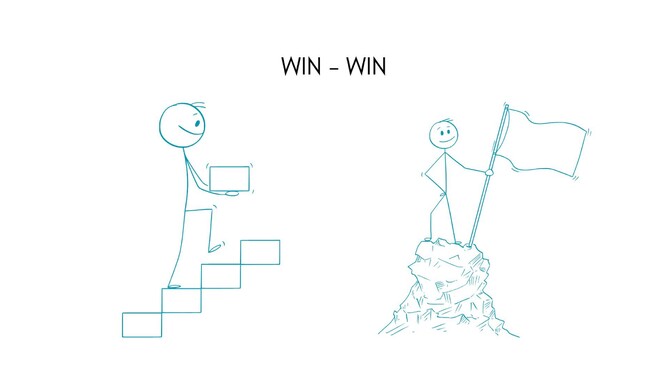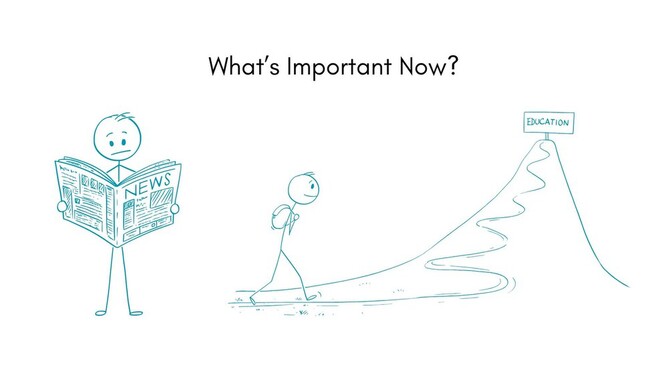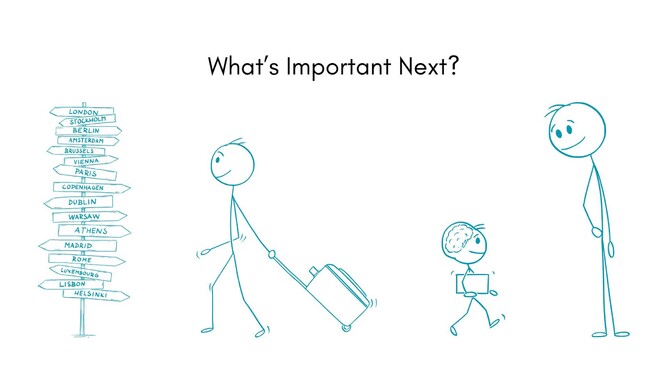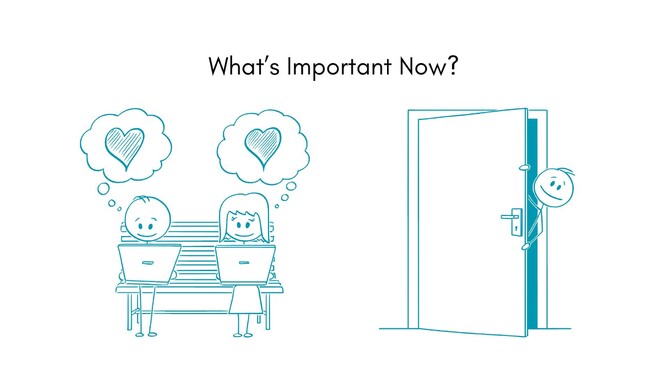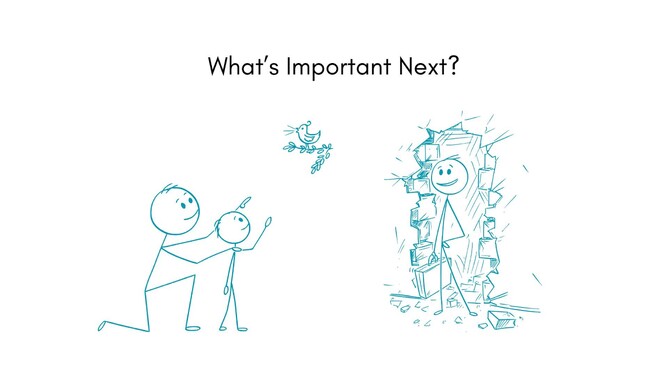‘Are you winning?’ one of my colleagues asks me, and I am so perplexed, I have to ask, ‘I’m sorry, what?!’ ‘Are you winning,’ my colleague repeats, and I think, ‘Ohh, you did actually say that.’ And I reply, ‘Yeah…, I think I am, yeah…’ - and I think, ‘Wow Tina, could you sound any more convincing…?!’
I’ve come across a few coaches who ask their teams to spell ‘fun’ right before a game or a race and the team chants back, ‘W - I - N’, and you have probably heard the phrase, ‘You either win or you learn,’ implying you don’t lose. (Btw, I think you do lose. Losing is a real thing and losing feels real, too. It’s not the most enjoyable of feelings, but eventually, after some time, you can learn from it. It's a ‘feel it first, learn from it later’ sort of situation.)
Those are just three little examples, three little anecdotes, that I think illustrate the ever-so-slight obsession we have with winning. I don’t think about winning much and I also don’t think I am particularly competitive. ‘Says the Olympian,’ I can hear my friends say… we have the conversation semi-regularly and they have a point, of course, I must have some level of competitiveness. But I've already told one of my friends she is right this week…, it might go to their head… ;)
I don’t think I am competitive in the way that I always have to win or be better than others. I am, however, quite competitive with myself. And getting a little bit better all the time matters to me. That does not mean I feel like I am winning all the time. At all.
A few years ago, I came across a way of looking at and using winning differently. It’s a play on WIN - WIN, a concept that the Merriam-Webster Dictionary defines as 'advantageous or satisfactory to all parties involved'. Sounds good, right?!
Well - this WIN-WIN^ offers a different view, a more personal one. It asks questions instead:
WIN = What’s Important Now?
WIN = What’s Important Next?
I like this WIN-WIN because it allows me to focus on being better than I was yesterday, rather than focusing on being better than others, though that may end up being a byproduct. It asks the clear question, how can I ‘win’ the present, right now, right here, and how can I ‘win’ the future, the next step. Often, we only look at one of those and miss the other. This concept invites us to consider both when making plans and decisions.
For example, you might wake up in the morning and after a while, you feel the urge to check your phone. It might give you a sense of calm or satisfaction that you have read messages that have arrived over night or that you caught up on the news. Maybe that is what's important now. Or maybe it is just what you have been doing every morning for so long now that it has become a habit… and maybe you didn’t need this, at all. And as things go with time on screen, perhaps now you find yourself doom-scrolling, heading down rabbit holes that you hadn’t planned to go down today. Or maybe this happens to you after work or at night, when you want to switch off from the day. And what was meant to take your mind off the busyness of the day for a few minutes ends in an hour or three online.
Maybe what’s important next requires a lot of focus. Maybe you have an important meeting during the day or you face an important conversation with a loved one or a colleague. Maybe you have something planned for today that requires your full focus and attention. And maybe that is what’s important next to you.
So, now you have started (or ended) the day with your phone and are distracted, which takes a mental toll and affects your concentration. It also means you are less present. If your phone has distracted you, it will take you about 20 min to get back to the same level of focus you had before getting distracted². By getting distracted, you have caused a detrimental effect on what’s important next.
I’m inviting you to think deeply about what’s important now and what’s important next and then approach them both deliberately so that one doesn’t get in the way of the other.
Say, travelling and visiting people is important to me, but it is expensive and I will have to save for it, then this is what’s important next. If I want to make sure I can travel in a few months, I need to plan, prepare and save for that. It may mean I won’t buy the new book I want to read (at least not as a hard copy), that I go out for dinner a little less, and so on, to allow me to save for the trip. It does not mean I wouldn’t go to the doctor’s if I am unwell and need to go - because that would be what’s important now. You get the gist.
You can see how there can be tension between what’s important now and what’s important next. But, if you think about both of them when making your decisions, you are more deliberately working towards what you want to do or be able to do. Athletes learn this early on. They might play their sport to compete and they might love the competition, but there are times during the year when they can’t compete because they need to start building the base for their performances during the season. That might mean spending more time in the gym, more time working on endurance, and more time working on the basics because that is what’s important now to enable them to do what’s important next.
Equally, sometimes we have to prioritise what has come up as urgent and important right now. If you are having a tough day, there may be no point in pushing through your plans. You may need to rest. That may become what’s important now for you to be able to do what’s important next.
So to close the loop on that first example: if you check your phone early in the morning, maybe reflect on what needs this is serving. Is it a need for connection? And if it is, can you limit your use to checking messages from loved ones, but refrain from checking social media? Or if it is about starting your day well-informed, can you limit your use to serve that need? Read the news, one particular newsletter, etc. without being sucked into a rabbit hole? Figuring out what you need first and then addressing that is useful and can help do what you need now without compromising what is important to you next.
I quite like this way of looking at winning, this way of using it to inform and drive what I do, rather than a result to aspire to. It means I need clarity on what I want overall, and a plan for how to get it or get there. Once I have a plan, I know what’s important now and what’s important next. It is also a good tool to get back on track if you find yourself in a situation where you ask yourself, ‘Hang on, what am I doing?’ Check in with yourself, how are you feeling, what do you want to be doing and feeling? And go from there.
WIN - WIN works well if you are competitive with yourself.
Do I always get this right? No. Do I always know exactly what’s important now and what’s important next for me? No. But I am often aware of it because I frequently ask the question:
What would WIN-WIN look like today, this week, or this month?
You can do the same.
If you have found this useful or it has made you think, please let me know. I would love to hear from you. Send me a message on Instagram @mankertina. And if you know someone who might find this useful, please share it with them.
Thank you for taking the time to read it all. I appreciate it & I appreciate you.
Key Points
Be deliberate & reflect on what you need now and what you need next.
Sometimes what we choose to do in the moment (now) might get in the way or hinder what we think is important next.
Sometimes we only focus on what’s important next and overlook what’s important now.
Reflection Questions:
What’s important now and what’s important next for something you are pursuing at the moment?
Think of a time when you didn’t do what was important in the moment, and instead found yourself doing something else. And think of a time when you only focused on what was important next and missed what would have been important now. If you could go back now, how would you change your behaviour?
Are there situations when you are more likely to compromise what’s important now or what’s important next? E.g. when you are hungry, grumpy, tired, sad, exhausted, busy etc. What are those situations? Identify them so you can be more aware next time.
^A colleague shared this concept with me a few years ago now. It's been useful in coaching to help people focus on more than one timeframe.
² If you would like to learn more about how devices steal our ability to focus, I recommend you read: Hari, Johann. Stolen Focus: Why You Can't Pay Attention - and How to Think Deeply Again. First edition. New York, Crown, 2021.
